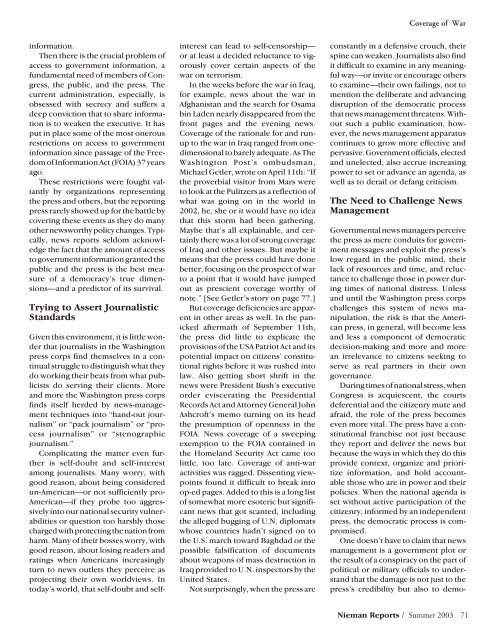summer-2003-Part 2-live - Nieman Foundation - Harvard University
summer-2003-Part 2-live - Nieman Foundation - Harvard University
summer-2003-Part 2-live - Nieman Foundation - Harvard University
- No tags were found...
You also want an ePaper? Increase the reach of your titles
YUMPU automatically turns print PDFs into web optimized ePapers that Google loves.
Coverage of Warinformation.Then there is the crucial problem ofaccess to government information, afundamental need of members of Congress,the public, and the press. Thecurrent administration, especially, isobsessed with secrecy and suffers adeep conviction that to share informationis to weaken the executive. It hasput in place some of the most onerousrestrictions on access to governmentinformation since passage of the Freedomof Information Act (FOIA) 37 yearsago.These restrictions were fought valiantlyby organizations representingthe press and others, but the reportingpress rarely showed up for the battle bycovering these events as they do manyother newsworthy policy changes. Typically,news reports seldom acknowledgethe fact that the amount of accessto government information granted thepublic and the press is the best measureof a democracy’s true dimensions—anda predictor of its survival.Trying to Assert JournalisticStandardsGiven this environment, it is little wonderthat journalists in the Washingtonpress corps find themselves in a continualstruggle to distinguish what theydo working their beats from what publicistsdo serving their clients. Moreand more the Washington press corpsfinds itself herded by news-managementtechniques into “hand-out journalism”or “pack journalism” or “processjournalism” or “stenographicjournalism.”Complicating the matter even furtheris self-doubt and self-interestamong journalists. Many worry, withgood reason, about being consideredun-American—or not sufficiently pro-American—if they probe too aggressivelyinto our national security vulnerabilitiesor question too harshly thosecharged with protecting the nation fromharm. Many of their bosses worry, withgood reason, about losing readers andratings when Americans increasinglyturn to news outlets they perceive asprojecting their own worldviews. Intoday’s world, that self-doubt and selfinterestcan lead to self-censorship—or at least a decided reluctance to vigorouslycover certain aspects of thewar on terrorism.In the weeks before the war in Iraq,for example, news about the war inAfghanistan and the search for Osamabin Laden nearly disappeared from thefront pages and the evening news.Coverage of the rationale for and runupto the war in Iraq ranged from onedimensionalto barely adequate. As TheWashington Post’s ombudsman,Michael Getler, wrote on April 11th: “Ifthe proverbial visitor from Mars wereto look at the Pulitzers as a reflection ofwhat was going on in the world in2002, he, she or it would have no ideathat this storm had been gathering.Maybe that’s all explainable, and certainlythere was a lot of strong coverageof Iraq and other issues. But maybe itmeans that the press could have donebetter, focusing on the prospect of warto a point that it would have jumpedout as prescient coverage worthy ofnote.” [See Getler’s story on page 77.]But coverage deficiencies are apparentin other areas as well. In the panickedaftermath of September 11th,the press did little to explicate theprovisions of the USA Patriot Act and itspotential impact on citizens’ constitutionalrights before it was rushed intolaw. Also getting short shrift in thenews were President Bush’s executiveorder eviscerating the PresidentialRecords Act and Attorney General JohnAshcroft’s memo turning on its headthe presumption of openness in theFOIA. News coverage of a sweepingexemption to the FOIA contained inthe Homeland Security Act came toolittle, too late. Coverage of anti-waractivities was ragged. Dissenting viewpointsfound it difficult to break intoop-ed pages. Added to this is a long listof somewhat more esoteric but significantnews that got scanted, includingthe alleged bugging of U.N. diplomatswhose countries hadn’t signed on tothe U.S. march toward Baghdad or thepossible falsification of documentsabout weapons of mass destruction inIraq provided to U.N. inspectors by theUnited States.Not surprisingly, when the press areconstantly in a defensive crouch, theirspine can weaken. Journalists also findit difficult to examine in any meaningfulway—or invite or encourage othersto examine—their own failings, not tomention the deliberate and advancingdisruption of the democratic processthat news management threatens. Withoutsuch a public examination, however,the news management apparatuscontinues to grow more effective andpervasive. Government officials, electedand unelected, also accrue increasingpower to set or advance an agenda, aswell as to derail or defang criticism.The Need to Challenge NewsManagementGovernmental news managers perceivethe press as mere conduits for governmentmessages and exploit the press’slow regard in the public mind, theirlack of resources and time, and reluctanceto challenge those in power duringtimes of national distress. Unlessand until the Washington press corpschallenges this system of news manipulation,the risk is that the Americanpress, in general, will become lessand less a component of democraticdecision-making and more and morean irrelevance to citizens seeking toserve as real partners in their owngovernance.During times of national stress, whenCongress is acquiescent, the courtsdeferential and the citizenry mute andafraid, the role of the press becomeseven more vital. The press have a constitutionalfranchise not just becausethey report and de<strong>live</strong>r the news butbecause the ways in which they do thisprovide context, organize and prioritizeinformation, and hold accountablethose who are in power and theirpolicies. When the national agenda isset without active participation of thecitizenry, informed by an independentpress, the democratic process is compromised.One doesn’t have to claim that newsmanagement is a government plot orthe result of a conspiracy on the part ofpolitical or military officials to understandthat the damage is not just to thepress’s credibility but also to demo-<strong>Nieman</strong> Reports / Summer <strong>2003</strong> 71
















